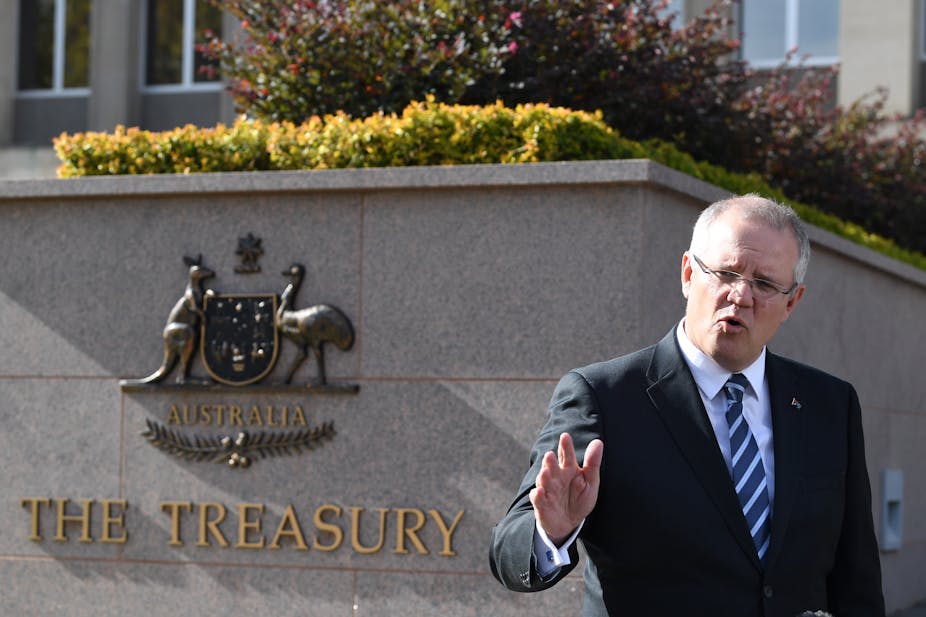A majority of economists in this month’s ESA Monash poll said the economic forecasts used in the federal budget should still be prepared by Treasury, despite difficulty in recent years.
The poll asked whether the the economic forecasts – in particular, the forecast of nominal GDP growth – should be outsourced to an independent body, such as the Parliamentary Budget Office.
In 2010, the UK Government gave the task of preparing economic forecasts to a newly-created Office for Budget Responsibility. The Australian Labor Party proposed doing the same ahead of the last federal election.
According to the IMF, 39 countries now have what it calls “fiscal councils”. These are:
independent public institutions aimed at strengthening commitments to sustainable public finances through various functions, including public assessments of fiscal plans and performance, and the evaluation or provision of macroeconomic and budgetary forecasts.
Since the early 2000s, Treasury has had difficulty making accurate forecasts of some of the key economic parameters underpinning the annual federal budget. In particular, Treasury’s forecasts of growth in nominal GDP – a key driver of revenue projections – have frequently been wide of the mark.
This largely reflects the difficulties Treasury has had in forecasting movements in Australia’s terms of trade, and hence in forecasting changes in the GDP deflator - a measure of the level of prices of all new, domestically produced, final goods and services in an economy. This is as opposed to errors in forecasts of real GDP growth.
Typically, Treasury has been insufficiently optimistic when the terms of trade have been rising (as they were between 2003-04 and 2008-09, and again in 2010-11), and too optimistic when the terms of trade have been falling (as they were between 2012-13 and 2015-16).
As a result, forward estimates of the budget’s “bottom line” – the “underlying cash balance” – have routinely been off.
Arguably, that was a nice problem to have when budget surpluses turned out to be larger than forecast. But it has been a source of much embarrassment in recent years. Both for Treasury and for politicians who promised an imminent return to surplus.
Treasury’s experience has been by no means unique. Indeed, an independent review of Treasury’s forecasting performance concluded that Treasury’s performance was “comparable with that of other domestic forecasters” and “comparable with, or better than, [that] of official agencies overseas”.
There have also been suggestions that the economic forecasts used in budgets have been the subject of political interference, although these have been vigorously refuted by Treasury heads.
The results
35 of our panellists responded to this month’s poll. Of these, 13 (37%) agreed with the proposition that the economic forecasts underpinning the budget should be outsourced, 20 (57%) disagreed, and two were uncertain.
Six of those who agreed with the proposition did so strongly. Only four of those who disagreed felt strongly about their opinion.
After weighting our panellists’ votes according to the confidence which they attached to their opinions, a majority were against the idea.
Respondents who agreed with the idea of outsourcing the budget’s economic forecasts typically did so not because they thought that an outside organisation would necessarily produce “more accurate” forecasts. Rather, in their view, an outside organisation was less likely to be vulnerable to (or perceived as being vulnerable to) political interference.
Most of those who disagreed with the proposition recognised that there was room for improvement in Treasury’s forecasting performance. But they were typically of the view that there was no reason to believe that an independent agency would do any better than Treasury had.
A couple of respondents argued that it was consistent with democratic principles for the elected government to take the responsibility for all of the projections and forecasts in the budget, including those of economic parameters.
The ESA Monash Forum is a joint initiative between Monash Business School and the Economic Society of Australia. Saul Eslake was a guest writer for the Forum.

